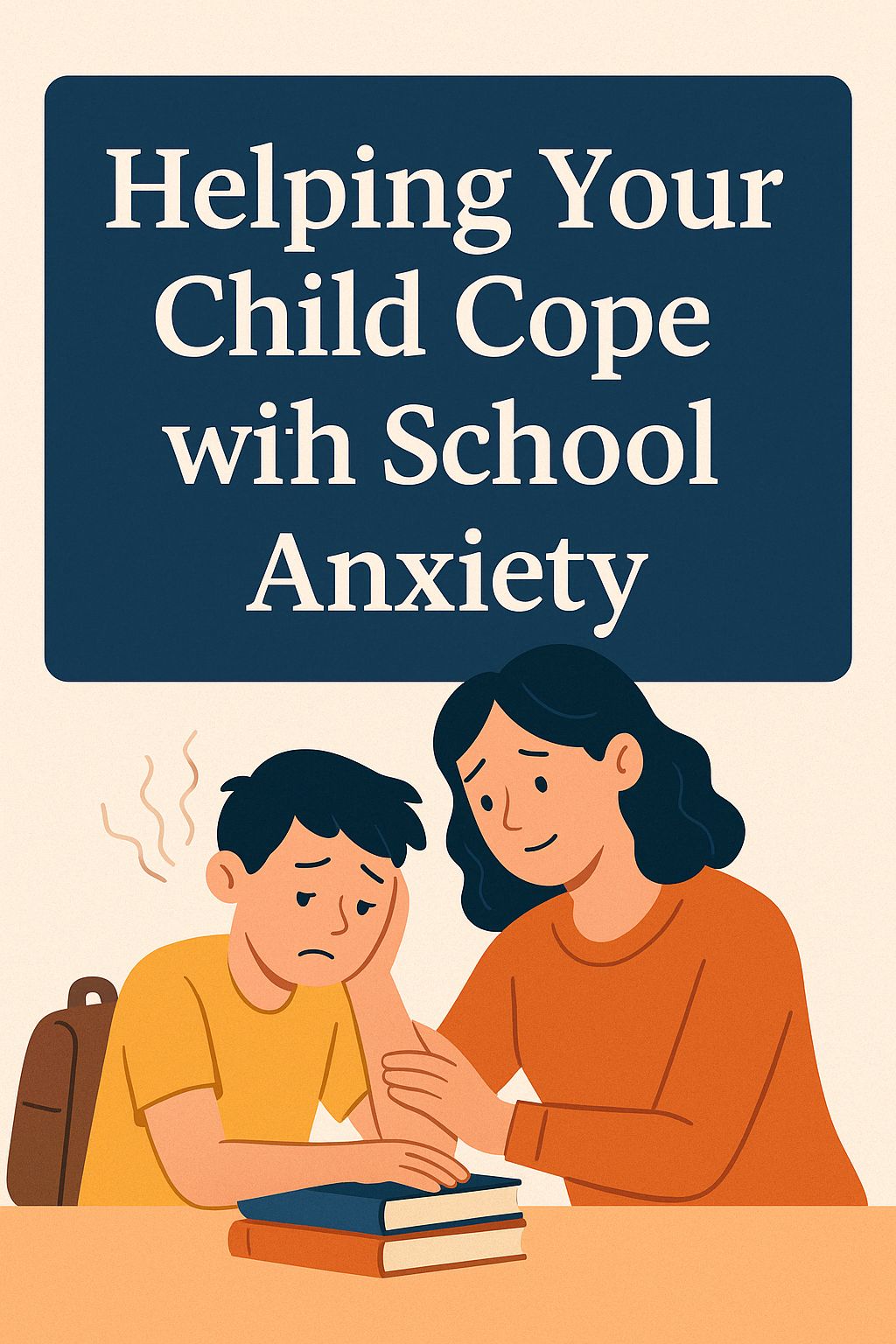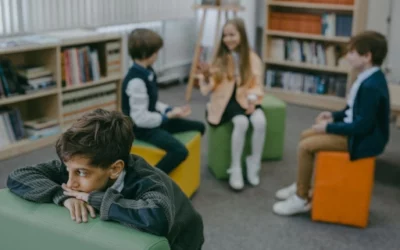It often starts with a stomachache or tears at the door. Maybe your child clings a little tighter or suddenly dreads getting ready in the morning. As a psychologist who has worked with countless children and families, I’ve seen these moments unfold in many ways. School anxiety is real—and it’s far more common than we talk about.
The good news? There’s a path forward, and it begins with understanding. If you’d like support at any point, get in touch with us here.
What Is School Anxiety?
School anxiety isn’t just about not liking school. It’s a deep emotional response—often invisible at first—that affects how a child feels, thinks, and behaves around school-related situations. Some children worry about leaving their parents, others about getting answers wrong or feeling out of place socially.
When I work with families, what I often see is not defiance—but fear. Children want to succeed. They want to connect. They just feel stuck.
Common Causes of School Anxiety
Each child’s story is unique, but here are some of the most common triggers I encounter in practice:
- Academic pressure: Feeling like they’re falling behind or not measuring up
- Social stress: Bullying, peer tension, or fear of social embarrassment
- Transitions: Starting a new grade or school, or changes at home
- Neurodivergence: Challenges related to ADHD, autism, or learning differences
The truth is, even subtle stressors can build up. That’s why it’s important to stay curious, not just corrective.
[American Academy of Pediatrics]
Recognizing the Signs and Symptoms
Kids don’t always say “I’m anxious”—they show us instead. Look for:
Physical Symptoms
- Recurring stomachaches or headaches
- Sleep issues before school days
- Changes in appetite or energy
Emotional and Behavioral Symptoms
- Clinginess or school refusal
- Irritability or meltdowns after school
- Withdrawal from favorite activities
Parents often tell me, “They’re fine on weekends!”—which is exactly the clue. The pattern matters.
How School Anxiety Affects the Whole Family
You’re not alone if school mornings have become a battle. I’ve sat with parents who feel exhausted, overwhelmed, and unsure if they’re “doing it right.”
An anxious child can unintentionally set off a domino effect: stress for siblings, disrupted workdays, and emotional burnout for caregivers. And yet, families also have incredible power. When the family shifts, the child does too.
Strategies for Parents: What You Can Do Today
Over the years, I’ve learned there’s no one-size-fits-all answer—but here’s where many families find traction:
1. Open the Conversation
Ask: “When does school feel hardest?” Avoid rushing in with solutions. Just listen.
2. Create Predictable Routines
Children thrive on knowing what’s coming. A simple morning checklist or visual calendar can make a huge difference.
3. Teach and Practice Coping Tools
We use things like deep belly breaths, drawing out fears, or grounding exercises in session—and you can bring these home.
You might also consider creating a self-soothe box together. Fill a small container with comforting items—like a favorite scent, small toy, photo, or stress ball. It becomes a portable toolkit for emotional regulation. See our assessment services
4. Break Tasks Into Steps
Help them tackle one thing at a time. Progress builds confidence.
5. Acknowledge Without Amplifying
Saying “I see this is hard for you” helps your child feel understood. You don’t have to fix everything in the moment.
Let’s talk about what this might look like for your child.
Supporting Sensory Needs at School
For many children—especially those with ADHD or autism—sensory overwhelm adds to anxiety.
Simple supports can make a huge difference:
- Noise-canceling headphones in busy hallways
- Fidget tools during lessons
- Access to a quiet space for sensory breaks
When schools understand and adapt to sensory needs, children feel safer and more in control.
Partnering With the School
When families and schools collaborate, change happens faster.
Don’t hesitate to reach out to the teacher, learning support, or school psychologist. You might:
- Request informal check-ins
- Ask for flexible deadlines or quiet spaces
- Explore IEPs or accommodations when needed
One of the most helpful things I’ve seen? Just having a “safe person” at school who gets it.
[British Columbia Ministry of Children and Family Development]
When to Seek Professional Help
If anxiety is interfering with sleep, eating, friendships, or learning—it’s time for extra support. You’re not overreacting.
In our practice, we offer:
- Assessments for anxiety, ADHD, and learning profiles
- Individual therapy using CBT and play-based approaches
- Parent consultation and school collaboration
We also provide a wide range of services for children dealing with school-related stress.
Therapy is about building a bridge—not removing every stressor. And when the right support is in place, kids often surprise everyone with their resilience.
Contact us today to learn more about the next steps for your family.
Creating a Supportive Home Environment
Anxiety shrinks when a child feels emotionally safe.
Here are small ways you can reinforce that safety:
- Make space for downtime after school
- Encourage movement and outdoor play
- Limit pressure to “perform” at home
- Normalize all feelings—without judgment
A parent once told me, “Our home became the place where it was okay to fall apart—and that’s when things started to change.”
Empowering Your Child for the Long Term
The goal isn’t to eliminate anxiety altogether—it’s to help your child believe they can handle it.
Celebrate moments of courage. Reflect on progress together. Teach them that anxiety is a part of life—not a roadblock to joy.
And most importantly: remind them they are not broken. They are learning, growing, and braver than they know.
Frequently Asked Questions (FAQs)
What age does school anxiety typically start?
Often as early as preschool, especially during transitions or new routines.
How can I tell if it’s anxiety or just school resistance?
Look at patterns. If your child shows distress consistently, especially in the mornings, anxiety may be the driver.
Can school anxiety affect academic performance?
Yes, anxiety can interfere with focus, participation, and memory—but improvement is possible with support.
What role does therapy play?
Therapy provides tools, language, and strategies tailored to your child’s needs. It also supports parents in feeling more confident and connected.
Let’s Talk
Does this sound familiar? You’re not alone. At North Shore Psychological Services, we specialize in supporting children with school-related anxiety and emotional challenges. Reach out if you’re ready to explore support options that truly fit your family.
Has your child experienced school anxiety? Share what’s helped—or what’s been hardest. We’d love to hear your story.





